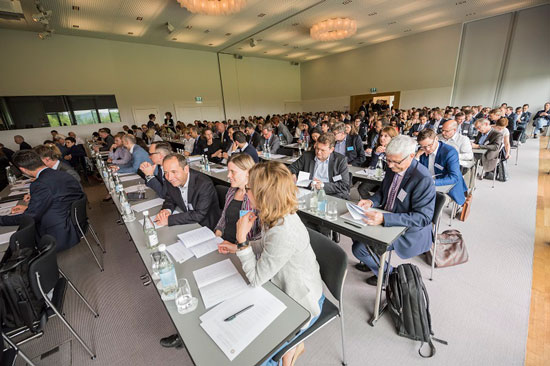A summary of discussions at the annual symposium of the Center for Corporate Reporting
How to avoid and prevent an illusory world – that was the mission of this year’s Geschäftsberichte-Symposiums (GBS) hosted by the Center for Corporate Reporting.
How can those responsible for reporting get the support they need for an authentic, easy-to-understand and relevant stakeholder-oriented report? This was the focus of top-notch plenary speakers and outstanding representatives from various companies leading best practice sessions at the GBS 2016. Here are the key takeaways in brief.

Center for Corporate Reporting's GBS 2016 event
Reporting should reflect the inner workings of a company
Individuals responsible for reporting and communications are called upon more than ever to make senior management and operational units aware of the links between corporate culture, behavior and communication.
An illusory world becomes evident when the annual report is thought of as a handsome image brochure that projects a corporate culture and management that has very little to do with the corporate realities of management, strategic direction and corporate governance.
Axel Lehmann, group chief operating officer at UBS, pointed out the danger in this. ‘You can’t report on anything that does not reflect the inner workings of a company,’ he said. Otherwise the report will satisfy minimum regulatory requirements but fail to present the business case to shareholders, employees, customers and other stakeholders in a clear, consistent, authentic and comprehensive way.
Accountants will save the world
Building trust through transparency and authenticity are not solely communication tasks. Reporting is primarily fact-based – and in the case of financial reporting, that means numbers-based. In order that the ‘soft’ factors, such as social or natural capital, attain the same weight in a company and in the capital market and can therefore be included in strategy and investment decisions, the key figures need to be presented in a way that makes them comparable.
Many years ago Peter Bakker, president of the World Business Council for Sustainable Development, predicted that accountants would save the world; he repeated this forecast with great conviction at the GBS. A paradigm shift in accounting and company valuation is already underway, with a number of capital market-oriented initiatives currently working on how to better unite the financials and non-financials in accounting, corporate valuation and reporting.
More sustainable businesses are more successful
Bakker underscored long-term thinking and sustainable investments with his statement ‘more sustainable businesses are more successful’. It is important for companies to realize that sustainable investments eventually lose the label of ‘eco’ or ‘green’, not least through their proven outperformance as they gain the attention of investors.
In Spring 2015, Dr Rudolf Wehrli, Dr Mirjam Staub-Bisang and Dr Peter Forstmoser made a submission to the Swiss Federal Office of Justice for the introduction of a loyalty dividend. Their proposal is that shares held longer than two years should yield a 20 percent higher dividend. Shareholder commitment and engagement should be honored with such a loyalty reward and this would foster a sustainable corporate strategy.
Dominique Biedermann, chairman of the Ethos Foundation, said that for him a compelling strategy, competent management team and long-term business model constitute the investment case. Holistic reporting can enable companies to identify issues relevant for the capital market.
Excellent reporting is integrated, digital, visualized, process-oriented and easy to understand
Our best practice sessions were as varied in subject matter as the reporting challenges facing decision-makers: we heard about the fast-close reporting process at Novartis, integrated reporting at UBS, use of infographics to visualize the business model at Coca-Cola HBC, and Online First as a reporting approach at Kuoni. Together with our speakers we have summarized the key lessons, and symposium participants may order the session handouts from our office.
Summing-up the takeaways of GBS 2016, we can say annual report producers are important catalysts. They convey the diverse stakeholder demands internally to management, support transformation processes and interdisciplinary collaboration, and report in diverse media on the direction of the company. They avoid illusory worlds and explain the company in a holistic and authentic fashion.
Dr Kristin Köhler is CEO of the Center for Corporate Reporting








